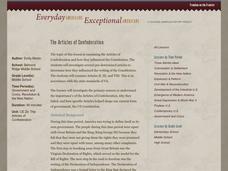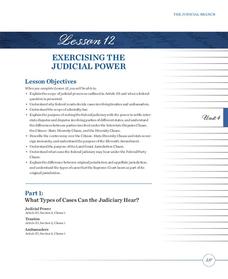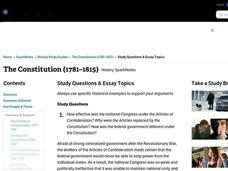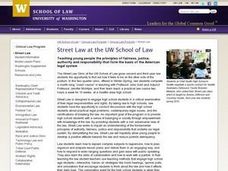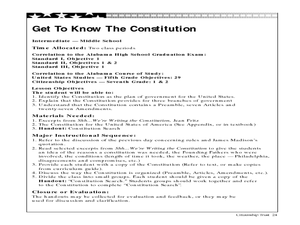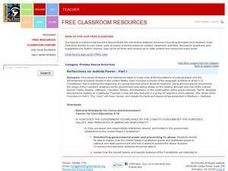Judicial Learning Center
Article III and the Courts
What's the best way to make sense of the Constitution? A helpful lesson contains both the text of Article III and annotation of each of its sections, breaking it down into easy-to-understand parts. It also includes links to a glossary...
Judicial Learning Center
Article III WebQuest
Why is Article III of the constitution so significant? Pupils discover the importance of Article III and how it relates to past as well as current events by completing Internet research using a provided handout. They learn everything...
Curated OER
The Supreme Court: The Judicial Power of the United States
Students investigate some basic facts about the Supreme Court by examining the United States Constitution and one of the landmark cases decided by that court. The operation of the Supreme Court forms the focus of the lesson.
Heritage Foundation
How to Read the Constitution
Even lawyers can find the US Constitution to be very wordy! Help learners create a foundation for understanding the Constitution with several analysis essays. Multiple activities complement the reading and allow for active and meaningful...
Roy Rosenzweig Center for History and New Media
The Articles of Confederation
Have you ever started a project only to realize you need to scrap it and start over? Scholars analyze the issues leading to the fall of the Articles of Confederation. A group investigation into Articles II, III, and VIII unveil the...
Curated OER
The Supreme Court: The Judicial Power of the United States
Middle schoolers learn basic facts about the Supreme Court by examining the United States Constitution and one of the landmark cases decided by that court.
Alabama Department of Archives and History
Alabama's 1901 Constitution: What Was at Stake?
Who should be able to vote? As part of a study of the 1901 Alabama Constitution, class members examine primary source document that reveal the reasons the authors gave to support their positions on this question and their assumptions in...
Curated OER
Case Study: Constitutional Law
Posed here is an issue of land ownership and law from the year 1773. Learners can use what they know about the US Constitution, statehood, and Articles I, III, and IV to answer five questions regarding the scenario.
Judicial Learning Center
About Federal Judges
Not just anybody can do the job of a federal judge, but according to the United States Constitution just about anybody can be appointed. The lesson outlines the process and requirements for becoming a federal judge, focusing on the...
Street Law
The Challenge of Selecting an Ideal Supreme Court Nominee
Nearly every president has had the opportunity to name a nominee to the United States Supreme Court. But what makes someone an ideal candidate to become a Supreme Court justice? High schoolers test their prior knowledge about the Supreme...
Heritage Foundation
Exercising Judicial Power
We should all do more exercising, but should the judicial branch as well? High schoolers develop their understanding of what powers the judicial branch carries because of the US Constitution, as well as where their limits lie in the...
C-SPAN
Supreme Court Justices Research and Resumes
According to Article III, Section1 of the United States constitution, the only qualification one needs to be appointed to the Supreme Court is to demonstrate "good behavior." The president and Congress are given the power to determine...
Curated OER
The Constitution (1781–1815)
In this online interactive history worksheet, students respond to 8 short answer and essay questions about the U.S. Constitution. Students may check some of their answers on the interactive worksheet.
Curated OER
Introduction to the Constitution: The First Three Articles of the Constitution, Separation of Powers
Students review the first three articles of the United States Constitution. In groups, they examine the three branches of government and their function. They follow the path of a bill until it becomes law and discuss Congress' role.
Constitutional Rights Foundation
If Men Were Angels: Teaching the Constitution With the Federalist Papers
Much like the methods of group work, the writers of the Federalist Papers worked together to advocate for their viewpoints against the anti-federalists. The resource enables learners to break into small groups and conduct research before...
Curated OER
Launching the New U.S. Navy
Students analyze United States Constitution, locate general references to common defense, and specific references in document to U.S. Navy. Students then respond to questions on Document Analysis Worksheet, and discuss relationship...
Heritage Foundation
Courts and Judges
If the Supreme Court is so supreme, why do all cases not just start there? High schoolers learn why every case does not start at the Supreme Court as well as the importance of hierarchy in the US judicial system in the 11th installment...
National Endowment for the Humanities
Background on the Patriot Attitude toward the Monarch
Learners explain the Patriot attitude toward the British monarchy, which helps them embrace the Founders' reluctance to have a strong executive under the Articles of Confederation as well as their desire to build in checks of executive...
College Board
Balance of Power Between Congress and the President
Three branches of government help create a system of checks and balances. A helpful resource provides a series of articles regarding the balance of power between the legislative and executive branches of government. Historians answer...
Heritage Foundation
Congress's War Powers
Declaring war is not as easy as some may think. High schoolers learn about Congress's limits regarding war by reading important clauses in the US Constitution. Various independent and collaborative activities reinforce learning, making...
Curated OER
Get To Know The Constitution
Students search the Constitution for specific information. In this Constitution lesson plan, students read the Constitution and search for the branches of government, specific Amendments, and more, in groups.
Curated OER
Writing a Class Constitution
Students view a short play and explore the United States constitution relating it to the importance of rules in the classroom and in the community.
Curated OER
US Government: The Constitution
Learners explore the branches of government. In this U. S. Constitution lesson, students examine the system of checks and balances in the U.S. plan of government as they read the document and define vocabulary words.
Curated OER
Reflections on Judicial Power - Part I
Students research the Constitutional provision for the Judicial branch of government. They examine different U.S. founder's positions on the relative strength of the judicial branch and act as a review court for Marbury vs. Madison.






